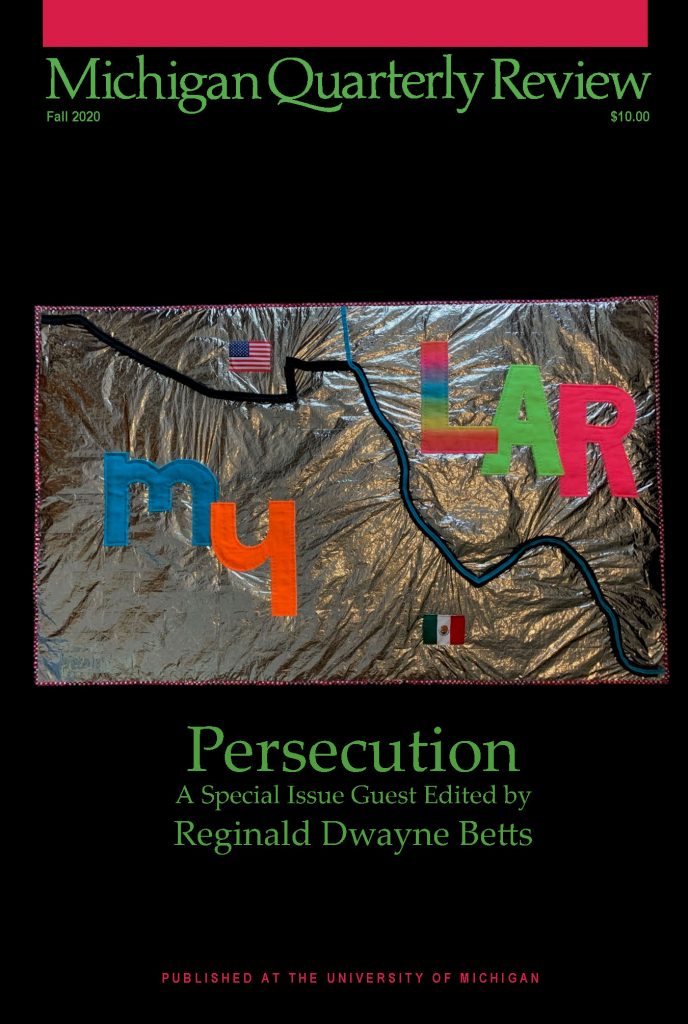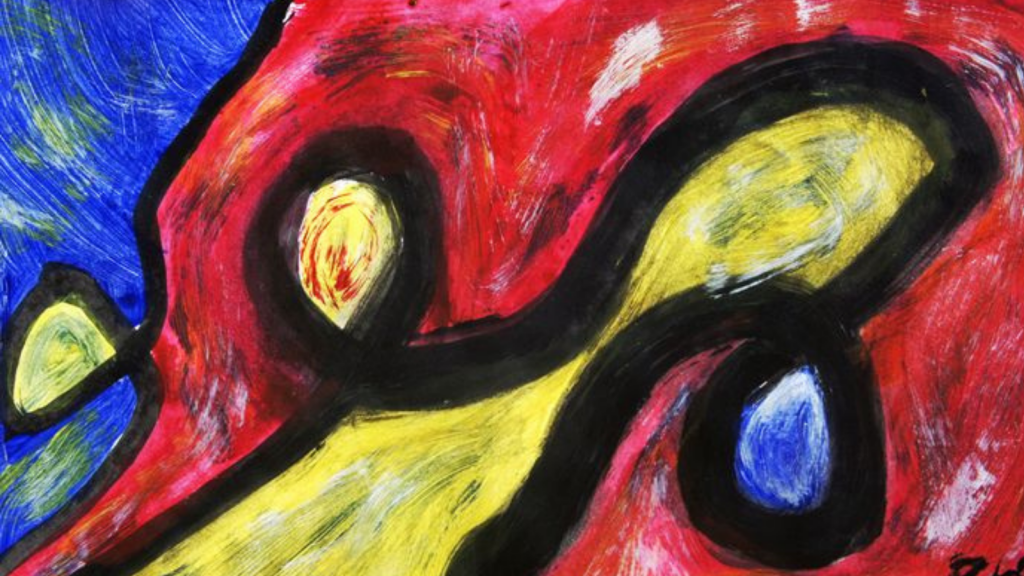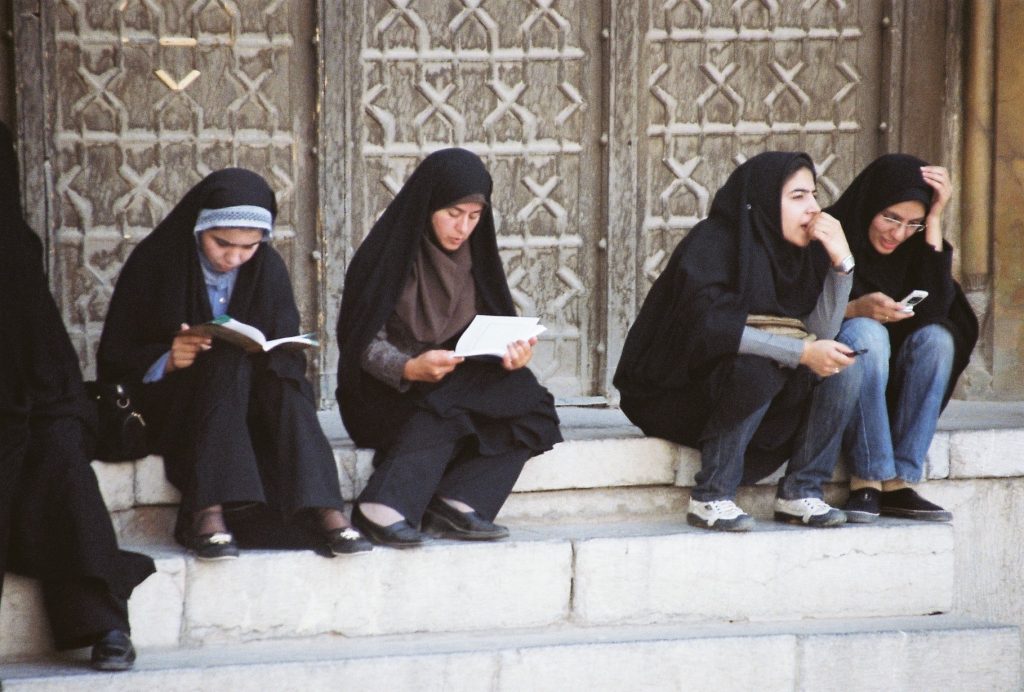Read an excerpt from Ahmed Naji’s “A Rot of Evidence” from our Fall 2020 issue on Persecution. Join us on November 21st to see Naji and contributors from MQR and Sukoon Magazine read virtually at the Arab American National Museum. RSVP here.
I carried the green bag containing the clothes they allowed me to keep and, in my other hand, the plastic bag containing my food. Under my arm was the blanket that the Intelligence Officer deigned to allow me to bring. I was stumbling in a loose, blue prison jumpsuit made of rough fabric. Four guards surrounded me while the Intelligence Officer and another officer were in front.
I was behind them, but I was leading the way.
We crossed a small garden that had several trees, mostly cactus plants.In the corner stood a carved wooden bust with distorted dimensions personifying a handcuffed prisoner writhing from some form of intestinal pain. I raised my head toward the building where we were walking, a two-story structure painted blue. On its facade was a mural depicting a tropical landscape with a waterfall pouring down from the roof, becoming a small stream inside a lush tropical forest with many colorful flowers. The only things puncturing the mural’s serenity were the building’s windows and front door. I paused looking at the strange scene. The last thing I imagined seeing in a prison is an example of our national tradition of kitsch, shitty and disgusting in all its perfection.
I had imagined prison as a gray room isolated from the outside world. But when prison became my life, my previous imaginings of it, formed from scattered literary and artistic treatments, seemed naively romantic. In reality, prison, as it turned out, is full of European romantic paintings, which for contemporary Egyptians are beautiful objects that they hang in their homes and juice bars. And with such colorful depictions, the state seeks to improve its human rights and gladly opens its jails to foreign media and delegations.
On the occasion that prisoners are pardoned, the prison authorities would order us to our cells. They would then bring out the army conscripts working in the prison, dressed in civilian clothes, and line them up in the prison garden. The prison doors would open for journalists and TV cameras to photograph them. The conscripts pretending to be prisoners, with the paintings of tropical beaches and Norwegian forests serving as background, would dance and laugh for the cameras. They would prostrate, staining their foreheads with the yard dust, and raise their arms with prayers and thanks to the President and the Minister of Interior for their mercy and their guidance.
Even the isolation that I imagined would accompany the gray prison hues did not exist. When the Warden locked the door of my ward, I found myself in a space meant for sixty prisoners but crowded with many more. Some lay on the floor, in the bathrooms, or in the kitchen. I was given a loft bunk, a concrete slab, 180 cm long and 30 cm wide. For my first hour, I was surrounded by the looks of the prisoners who were astonished by the way I entered the ward accompanied by the Intelligence Officer, who personally chose my bunk for me. Soon I was forced to pray with my fellow prisoners, drinking tea with them, smiling, listening, making small talk, and all the rituals of social integration.
One young prisoner took my bags, dusted my concrete bunk, and wiped it with a damp cloth while another inmate sat me beside him on his bunk. Another prepared tea for me, and a fourth offered me a cigarette. The young inmate who cleaned my bunk, then spread the blanket they allowed me to bring, folded it in half so that I slept on one part and covered myself with the other. It was February, and I could feel the damp cold in my bones. With a smile on his face, he said, “I folded the blanket like a sandwich for you.”
Another commented, praising the young inmate’s work, “So and so is the best spreader in prison.” The word “spread,” because of its sexual innuendo, provoked a wave of loud laughs. And soon the jokes and puns that I’d abandoned in high school returned here among more than sixty male inmates to become one of the basic elements of our daily speech. When on another occasion a prisoner said to another, “Take it,” a third chimed in, “How can he. This is no place to take it in,” making half of the ward burst out laughing at the sexual allusion. The language that caused me to be imprisoned has become the soup that I daily consume along with crumbs of Egyptian kitsch. Give us our sustenance, O Lord of the Heavens, O King of kings, you who give to whom you wish, forgive whom you will, and humble whom you see fit.
I never had a view of life or a mission that would qualify me to teach others, neither to guide them nor alienate them. I was not part of political struggles, not a member of the Muslim Brotherhood or Salafists. I simply wrote a novel about my own sense of shattering. About my friends whom I loved and who did not love me and who loved me even though I never saw myself worthy of all their love. About the city that swallowed my young years and made me an ignorant, arrogant person. It was an educated citizen from the legal profession, supported by another citizen who was more trivial than him working as a journalist who took me to court. The Public Prosecutor’s Office handled the case and moved it along every step, and they were the ones who appealed the ruling when the first court acquitted me. The opponent whose modesty was assaulted is the same authority that claims not to be religious and who brandishes the fires of hell and insists they are the light of enlightenment.
Day 7, Saturday, February 27, 2016
On my bunk and I’m melting from drudgery. I read Ali Bader’s novel Papa Sartre and hope it doesn’t end. I chew on every page because the end of the book would increase the weight on my chest and the painfully slow passage of time.
I think of the beautiful buttocks mentioned in the book. And all the beautiful buttocks I have seen. I miss sex, and I can’t find anywhere to masturbate. In the morning, someone had knocked on the bathroom door and asked the occupants to come out, repeating the famous prison cliché,
“Enough milk, or you’ll clog up the sewer pipes.”
I train my memory by writing and recording names. I console my dreams with wishes. I imagine everyone with me in Nuweiba in Sinai sitting for a meal. All my loved ones are by the sea feasting and laughing together without worries or grudges.
I try to control my temper and not to overreact. Displays of emotional instability have dire consequences. You do not want to go to solitary.
The Book As a Mask
Anonymity depends on suppressing opinions that represent your class, politics, or religious views. You must remember to use the most familiar clichés and platitudes in answering questions. You say such things as maalaish (never mind), God is generous, and may God help you, etc.
The mask requires putting on a calm, friendly smile while accepting the piss that the other person is uttering, no matter how much hatred, stupidity, and racism they express. Smile as if it were a joke; assume innocence and show no signs of your awareness of their hideousness.
This mask proved very effective in gaining the respect and affection of other prisoners and the guards. But the burden of wearing it all the time was the heaviest I’ve had to bear.
Reading was the intermission during which I could remove the mask. While reading, I answered everyone who interrupted me with short, non-evocative responses, as if to say that I did not exist with them when I read.
My being on a top bunk was another burden. All my things, in plastic bags hung on nails in the wall, were exposed for all to see. I knew I was put on a top bunk to be visible to all the “sparrows” in the ward. Every word I uttered, my every movement, what I read, and with whom I spoke, how many times I visited the bathroom, and the duration of each visit all were conveyed to the prison administration by more than one source. But when reading and wearing my book mask, I am veiled from the world of scrutiny. I meet individuals with whom I do not need to wear a mask, and immersed in various events in different times and places, we discuss things seriously and even argue. A fellow inmate gently nudges me, “It’s only your first week, and you’re already talking to yourself?”
The Authorities’ Peace of Mind
The highest prison authorities are the Warden and the Intelligence Officer. Every request or any concern that pertains to me requires the approval of the Intelligence Officer, Mahama Bey, as the guards pronounce his name.(1)
Prisoners are not allowed visits on their first thirty days, whereas a remand prisoner can receive a visit after eleven days. I, however, received my first visitor a few days after I arrived, the lawyer Mahmoud Othman. Surrounded by three guards, he told me that he’d brought me books and letters from Yasmin and from friends. After the visit, I asked the guards about the books and the letters, and they told me that they were with Mahama Bey for inspection.
For three days, I was on the lookout from my bunk, hunting down every guard who passed by the ward or came in to take some of our bread or the pasta we cooked. When I nabbed one, I’d give him a pack of cigarettes, ask him about my letters and books, and ask to please pass on my request to Mahama Bey. In the beginning, they lied to me to comfort me. He’s left for the day, or he’s in but his door is not open.
It took me time to understand the ways of prison. I learned of the changes in leadership and the rise and fall of ranks from gossip that old prisoners shared and from small bits of information the guards shed when I lavished them with cigarettes or fruit. Through these cognitive fragments, as Roland Barthes says, I understood that the top priority of any figure of authority, including Mahama Bey, is to expand his power through permanent conflict and the creation of hurdles for his colleagues and superiors. His second goal is peace of mind.
The guards as it turned out had not forwarded my requests to Mahama Bey, because they did not want to annoy him, because every inconvenience they caused him will not detract from his view of them as dogs whose job is to preserve his peace of mind. Acting like shepherd dogs, they took advantage of my affliction and need. They bilked me of the cigarettes and fruit I offered them like pagan priests who never conveyed my prayers to the stone deities.
Day 21, Saturday, March 12, 2016
Since my arrest, I’ve met prisoners charged with different criminal felonies and political offenses, guards, and various police personnel, from Major General Deputy to the Minister of Interior to police privates. All of them were curious about “the story” that led to my imprisonment; why, and how come I was sentenced to two years in prison for a book?
Mechanically, I repeat the general story line, saying it’s about an earthquake that hit Cairo during the Khamaseen wind season, burying the city under the dirt and sand. They would interrupt me asking, “Did you say something bad about somebody?”
“No, the novel was not about politics.”
“No, but just like you’re saying, you must have said something bad
about someone.”
“No, by God, as he told you, there were only some bad words.”
“What kind of words?”
“Words like what you’d hear when two people are fighting on the street,
like ‘faggot,’ ‘your mama’s pussy.’ Stuff like that.”
The guard would then suck his lips and leave.
A Lieutenant General and head of a security sector stopped the prison transport truck before it set off to a police station and asked the guards to wash it inside out. He then began to scold them and the lower rank officers for neglecting maintenance and for not taking good care of the ministry’s resources. He then came over to me, removed his sunglasses, and asked me seriously, “Do you think Nagib Mahfouz smoked hashish?”(2)
The answer I was sure of was, “Yes, sure, he must have tried it,” but I also felt I was snitching on Mahfouz. I thought these are crazy days. I have been in prison for a long time, and I have no idea what’s going on. Maybe they’re fabricating a case against Nagib Mahfouz or his ghost. I stuttered, then fell silent. But the general’s gaze, and his suit decorated with golden swords, kept urging me to answer, so I said, after hesitating:
“I don’t know, excellency.”
He laughed mockingly at my answer:
“Don’t know! How are you a writer then? I will tell you. Hashish and drugs expand the imagination and allowed him to see and create the worlds that he was writing about. I mean, when he created the character of Si Sayyed and Amina, each of them required imagination. Hashish brings these kinds of ideas. It’s normal for people to take hashish, but not all people can write or do what Nagib Mahfouz did.”
I pretended to be impressed by the eloquence and genius of his excellency as well as the preponderance of his mind. After more than three hundred days in prison and from the dozens of Ministry of Interior personnel that I had gotten to know, I learned a lot about flattery and currying favor with the higher ranks, so I asked his excellency if he had any literary interests, and the answer was just as I expected.
He stood in his bright uniform, holding the two-way radio—the junior officers, policemen, prisoners around him all looking at me with amazement wondering who is cracking jokes with his excellency the general. My clothes were dirty from sleeping in the holding station, and pain was pressing on my bladder and kidneys. For more than twenty minutes he talked about his passion for writing and about the pleasures of the imagination, opening his fingers and pointing up every time, he said, “Imagination is the highest mental pleasure, and this is more important and more sustaining even than the pleasures of the body.” I nodded in agreement, thought about his broad, sagging body, and imagined the transient physical and moral pleasures that remained in it. His excellency added:
“I had literary attempts at some point but stopped due to the pressures of work. Once I retire I will get back to it again. I have thousands of stories and great ideas for dozens of TV series.”
We both wished each other success in our creative careers. I got into the prison transport truck, and his excellency drove off to check the security sector that was his charge.





